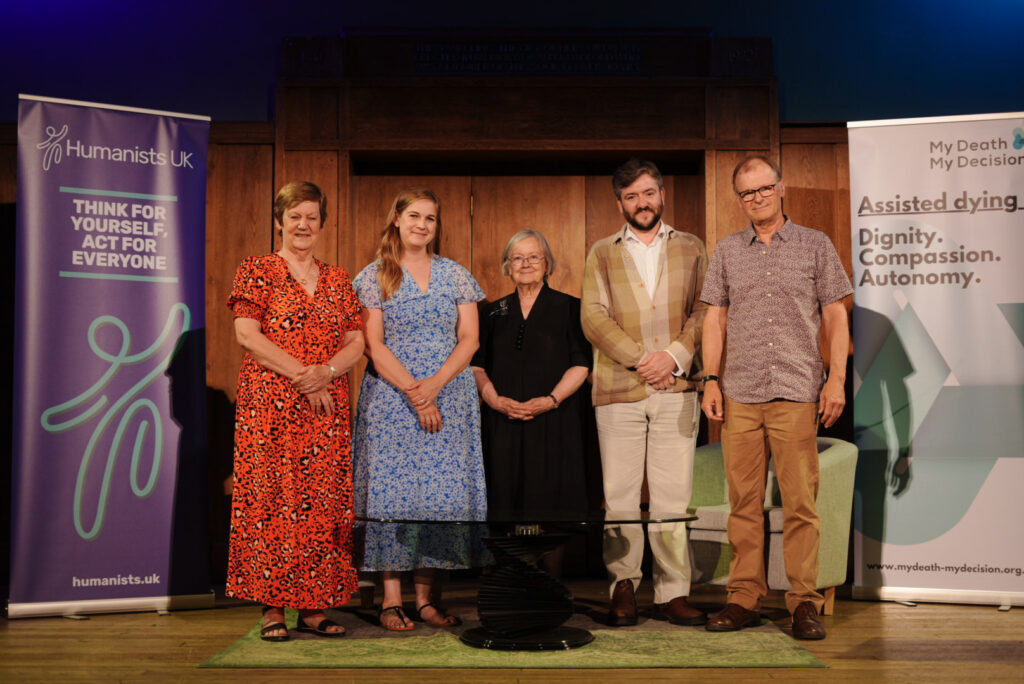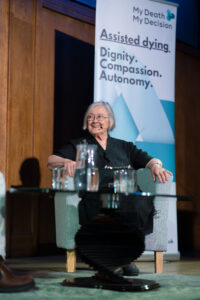
Last night, at an event organised by Humanists UK and My Death, My Decision to reflect on ten years since the pivotal ruling in R (Nicklinson) v Ministry of Justice, Lady Hale reflected that it is cruel and inhumane to force people who are incurably suffering to go on living against their will.
Lauren Nicklinson, daughter of assisted dying campaigner Tony Nicklinson, shared how her father had wished he had died and that an ambulance had never been called. She also spoke emotionally about the hate the family received, “We had letters from religious organisations telling us we were going to burn in hell.”
Lauren Nicklinson said:
“I appreciate that some people value life for what it is. But please do not deny everyone else the freedom of choice because it conflicts with your own moral or religious values.
Because ultimately this is all about autonomy and individual choice. What is right for you isn’t necessarily right for me and vice versa. Dad wanted to bring about his death – not anyone else’s. And if my brain is battered by a blood clot one day and history is repeated, I am confident I would want a way out – but I am certain I would want that choice as a minimum.”
Tony Nicklinson experienced a devastating stroke that left him with Locked-in Syndrome, paralysing him from the neck down with his only form of communication being through eye movements. After the High Court ruled against him in 2012, Tony died two weeks later from pneumonia, having refused food and treatment.
Jane Nicklinson, Tony’s widow, continued the legal battle with Paul Lamb, a former builder and father of two, who was paralysed from the neck down in 1990. They took the case through the Court of Appeal and ultimately to the Supreme Court. On 25 June 2014, the Supreme Court ruled against the Nicklinsons and Paul Lamb with a notable dissent from two judges, Lady Hale and Lord Kerr.
 When asked about the lack of nuanced political debate on assisted dying in England and Wales, The Right Honourable Baroness Hale of Richmond said:
When asked about the lack of nuanced political debate on assisted dying in England and Wales, The Right Honourable Baroness Hale of Richmond said:
“I wish more politicians would say ‘this is hard, but it needs to looked at and it needs to be sorted and we’re going to work hard at getting the best result.’ Why don’t you say that? This is hard and the hard questions are the really important questions. We have answered a lot of very hard questions in this country and we could still do that.”
Lady Hale said:
“Parliament has not put things right, despite all the evidence that the public would support a change in the law. And such proposals as have been debated are limited to terminally ill people with only a few months to live…Of course, there must be proper safeguards to make sure that their decisions are freely made. But it is cruel and inhumane to force them to go on living against their will That is why I support My Death, My Decision.”
Trevor Moore, Chair of My Death, My Decision, said:
“Tonight we honoured Tony Nicklinson and Paul Lamb, fearless advocates for the right to a compassionate death. Their tragic conditions were not terminal, highlighting the injustice of recent parliamentary Bills that, if passed, would have restricted assisted dying to those who are terminally ill with a prognosis of six months or fewer. That would have been both arbitrary and discriminatory.
“Parliament has long avoided addressing assisted dying. It is our hope that the forthcoming parliamentary session will allow a full debate and vote on a change in the law that we know has overwhelming public support.”
Notes:
Members of the MDMD team, as well as individuals affected by the current law on assisted dying, are available for interview upon request
For further comment or information, media should contact Nathan Stilwell at nathan.stilwell@mydeath-mydecision.org.uk or phone 07456200033.
Media can use the following press images and videos, as long as they are attributed to “My Death, My Decision”.
My Death, My Decision is a grassroots campaign group that wants the law in England and Wales to allow mentally competent adults who are terminally ill or intolerably suffering from an incurable condition the option of a legal, safe, and compassionate assisted death. With the support of over 3,000 members and supporters, we advocate for an evidence-based law that would balance individual choice alongside robust safeguards and finally give the people of England and Wales choice at the end of their lives.

